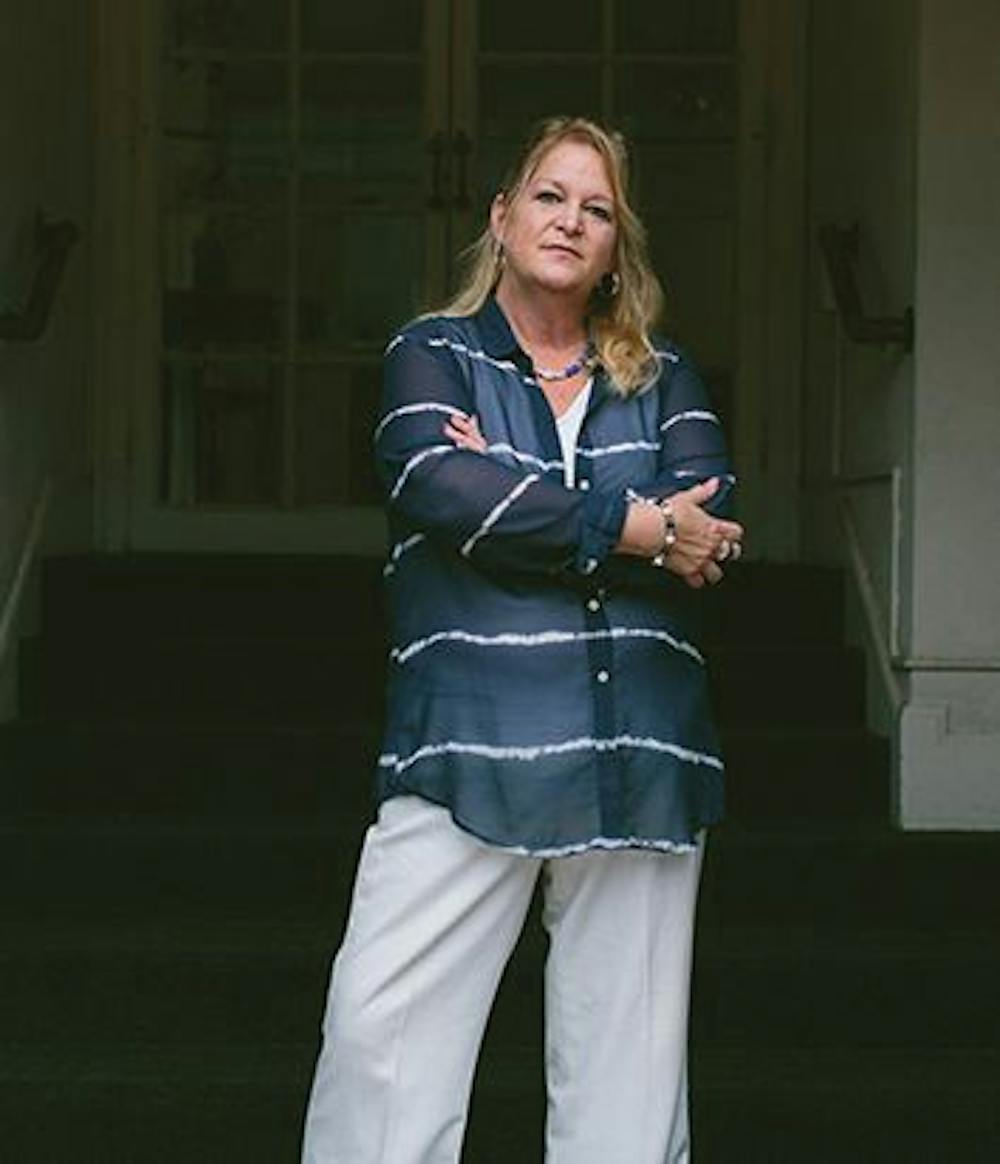From surviving human trafficking to eventually campaigning against it, one 1987 Ball State alumna has written books, founded an organization and helped pass legislation years after escaping.
“The Slave Across the Street” by Theresa Flores explains how she “became enslaved into the dangerous world of sex trafficking all while living with her parents in an upper-middle-class suburb of Detroit,” according to the book’s description.
Flores said her 10th anniversary edition of the book — originally released in 2009 — “talks about the aftereffects of human trafficking upon a person, mostly psychologically.”
“Even once a person survives it and escapes it, it’s not over,” she said. “The book discusses the journey that I had to take to be who I am today as a leading activist and owner of a nonprofit to help stop this issue.”
Her story:

Theresa Flores authored a book titled “The Slave Across the Street.” This book is fifth in her series of books all based on human trafficking. Theresa Flores, Photo Provided
Originally from Indiana, Flores said she and her family moved to Michigan, where she was trafficked during her junior and senior years of high school.
When it comes to human trafficking, she said people typically associate it with foreigners or kidnapping, but Flores wasn’t taken from her family.
Instead, Flores said when she started at her new high school in Michigan, she met a boy who pretended to like her.
“He asked me for a ride home from school, and I took the opportunity because I had a crush on him, but he didn’t take me home from school,” Flores said. “He took me to his house. He drugged me and raped me. Then, what I didn’t know at the time was that there were other people there taking pictures of it.
“So, for two years they blackmailed me with the pictures, and at night, I would sneak out of my house and meet them. They would show me to other people.”
After she graduated, her family moved to Connecticut and eventually back to Indiana, allowing her to leave her perpetrators behind.
At Ball State:
Flores said she started her college career at Eastern Connecticut State University, but transferred to Ball State after her sophomore year.
While she was in Connecticut, she said she was “really suffering a lot from the trauma,” so by the time she got to Ball State, she knew “something was wrong.”
She said she couldn’t sleep. She would wake up from a nightmare, go for a run and then go back to her dorm. But on Ball State’s campus, she found herself able to sleep better because she felt safe.
Flores started going to the university’s counseling center and became a staff member in the residence halls, where she made friends who she said were “like a family” to her.
In addition to her extracurriculars, Flores studied social work, which she said “really helped me look at myself and do a lot of self therapy, but it was also just a time for me on that beautiful campus to become Theresa again.”
Because she felt safer at Ball State, Flores said she was able to open up to her boyfriend at the time. She also dedicates a chapter of her book to him and his attempts at helping her move on from her traumatic experiences.
After graduation, she decided to finally tell her parents what had happened right under their noses, but she said it took many years for her to tell them the full story.
“They were in shock. They really didn’t know what to think. It was very difficult for them to process as well,” Flores said. “So, I still didn’t have the proper terminology or words to explain it well at all either.”
Twenty years after her experience, she said she was finally able to “begin the process of healing.”
Flores’ work:
This book, a memoir, is her fifth one. All her other books are also based on human trafficking. “Slavery in the Land of the Free,” for example is a book for middle and high school students explaining what human trafficking is internationally and domestically, she said.
“That [book], we promote a lot with teachers and people that work with younger youth to try and help educate them on this so that they don’t become victims,” Flores said.
Flores said besides not participating in it, “there’s very little that just the average person can do to stop human trafficking.”
So, in 2010, she started a nonprofit called Save Our Adolescents from Prostitution (SOAP). Volunteers at the organization help attach sticker labels to bars of soap with information about the National Human Trafficking Hotline. These are then distributed to hotels and motels in the volunteers’ area.
“We provide the hotline number on the bar of soap, so hopefully when they go to the bathroom they see it,” Flores said.

In 2010, Theresa Flores founded an organization called Save Our Adolescents from Prostitution (SOAP). Volunteers at the organization help attach sticker labels with information about the National Human Trafficking to bars of soap, which are then distributed to hotels and motels in the area. Theresa Flores, Photo Provided
Apart from holding survivor retreats at their Michigan office where they help survivors “heal and grow,” the organization offers emergency services to check for common health issues seen in victims of human trafficking including sexually transmitted diseases, pregnancy, infections and substance abuse, according to the Department of Health and Human Services.
“It’s amazing to think that there’s so many women out there who don’t have [the skills we teach during our retreats,” Flores said. “That’s why it was a wonderful thing for me to already have a social work degree and be able to utilize that to give these women resources.”
The organization also provides counseling; although, Flores said it was difficult to find counselors who knew and understood human trafficking and its effects since the recovery process is “definitely a journey, not a destination you reach.”
Ronald Dolon, professor of social work who taught Flores during her time at Ball State, said he was made aware of Flores’ work by one of his students during a human trafficking immersive learning project in 2018.
“I was just overwhelmed by what she had accomplished and is still accomplishing,” Dolon said.
He classified Flores’ social work as a macro-level practice — involving community-organizing and forming agencies nationwide.
“[Human trafficking] is one of the newer areas in social work, so we are just really touching the surface,” Dolon said. “What’s interesting is when she was a teenager … we didn’t even know what was called human trafficking, but now there’s more awareness about the problem, more interest in it.”
Ending human trafficking:
Flores said while outreach, education and prevention were necessary to help curb human trafficking, “the only way to actually stop it is to go after the demand.”
So, she has testified in support of two human trafficking-related legislation in Ohio and Michigan, the latter named the Theresa Flores Law, which removed or lengthened the statute of limitations in human trafficking-related cases, according to Michigan’s Department of Attorney General’s website.
This allows survivors, especially minors, to file a case years after the alleged crime has taken place, Flores said.
Flores also said law officials needed to go after the buyers and purchasers instead of the victims, especially in prostitution cases where the female was arrested 61 percent of the time, according to the FBI’s 2017 Uniform Crime Report.
“It’s very sad because this is something that men have done to them, but unfortunately, they’re the ones having to put their lives back together,” Flores said.
“Nobody wants to sell their body 20 times a night, every night of the week. If we instead said, ‘You shouldn’t be buying another person because that’s slavery,’ and we started arresting the men who were purchasing them, making the penalties higher … we could actually stop human trafficking.”
Contact Rohith Rao with comments at rprao@bsu.edu or on Twitter @RaoReports.





